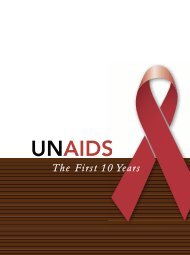Task Shifting - Global Recommendations and Guidelines - unaids
Task Shifting - Global Recommendations and Guidelines - unaids
Task Shifting - Global Recommendations and Guidelines - unaids
You also want an ePaper? Increase the reach of your titles
YUMPU automatically turns print PDFs into web optimized ePapers that Google loves.
<strong>Recommendations</strong> on the organization of clinical care services<br />
• Recent documentation of task shifting type III is less plentiful than that available for task<br />
shifting types I <strong>and</strong> II because there has been less reported experience of type III..<br />
Selected examples of experience/additional resources:<br />
The WHO-Commissioned Study on <strong>Task</strong> <strong>Shifting</strong> identifies numerous examples of the creation<br />
<strong>and</strong> effective deployment of new cadres of community health workers as part of the task shifting<br />
approach in those countries studied.<br />
In Ug<strong>and</strong>a, community health worker have been trained to fulfil a variety of roles in the delivery of<br />
HIV services. Some follow a 12-week course involving 6 weeks of classroom teaching <strong>and</strong> 6<br />
weeks of clinical clerkship covering a range of theoretical <strong>and</strong> practical clinical skills related to HIV<br />
services. Others take a 12-day course that prepares them to offer adherence support, group<br />
education <strong>and</strong> counselling.<br />
In Haiti <strong>and</strong> Rw<strong>and</strong>a, community health workers contribute to over half of the HIV-related tasks,<br />
including HIV testing activities, patient visits, management of patients prior to <strong>and</strong> after initiation of<br />
antiretroviral therapy, prevention of mother-to-child transmission <strong>and</strong> long-term follow-up of<br />
patients on antiretroviral therapy.<br />
Recommendation 21<br />
People living with HIV/AIDS who are not trained health<br />
workers can be empowered to take responsibility for certain<br />
aspects of their own care. People living with HIV/AIDS can<br />
also provide specific services that make a distinct<br />
contribution to the care <strong>and</strong> support of others, particularly<br />
in relation to self-care <strong>and</strong> to overcoming stigma <strong>and</strong><br />
discrimination.<br />
Comment: This recommendation places high value on the evidence that good health<br />
outcomes can be achieved when service users are empowered to participate in the<br />
management of their own condition. Self-management also contributes to the rational<br />
redistribution of tasks for HIV services (task shifting IV). The recommendation also recognizes<br />
the value of people living with HIV/AIDS as expert patients <strong>and</strong> the benefits of peer support in<br />
HIV services.<br />
Summary of findings<br />
Through a logical extension of the task shifting approach, people living with HIV/AIDS can be<br />
empowered to participate in a number of tasks relating to the management of their own condition<br />
<strong>and</strong>, by doing so, free more of the time of trained health workers. In addition, they have a unique<br />
contribution to make in providing care <strong>and</strong> support to others through counselling, adherence<br />
support <strong>and</strong> other services. People living with HIV/AIDS can also make a particular contribution as<br />
trained community health workers (as discussed in Recommendation 20). In these ways, people<br />
living with HIV/AIDS can contribute to the further expansion of the available human resources for<br />
delivering HIV services <strong>and</strong> to improvements in the quality of care.<br />
There are many studies that describe the involvement of patients in chronic disease management<br />
in high-income countries 244-254 . In particular, self-management plays an important role in the<br />
48

















